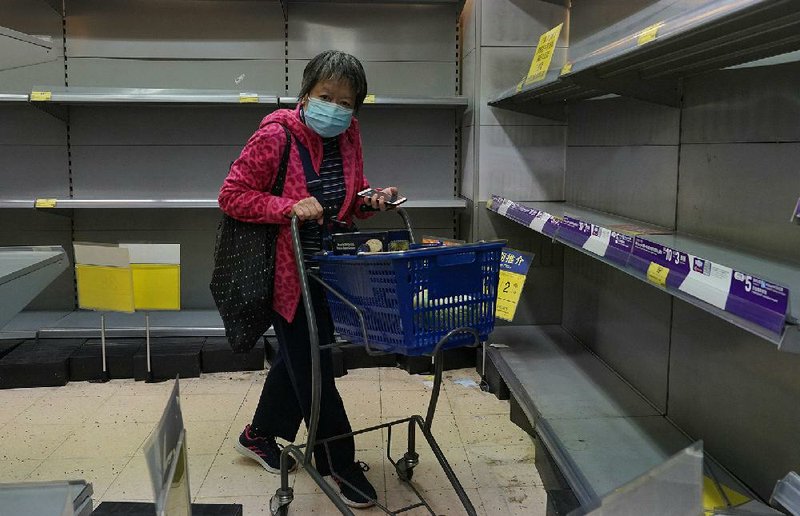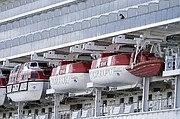WUHAN, China -- Chinese authorities strengthened their coronavirus lockdown in Wuhan on Thursday, ordering house-to-house searches, rounding up the sick and warehousing them in a convention center and other buildings that have been converted into makeshift quarantine internment camps.
The steps were announced by Vice Premier Sun Chunlan, the top official leading the response to the virus, as she visited Wuhan, the central Chinese city at the hub of the outbreak.
The city and country face "wartime conditions," Sun said during the visit. "There must be no deserters, or they will be nailed to the pillar of historical shame forever."
Word of the new restrictions came as people in Wuhan and elsewhere received news that Dr. Li Wenliang, who had warned of the outbreak in December and was silenced by the police for it, had died from the coronavirus.
The severity of the new restrictions risked creating a humanitarian crisis in Wuhan, a city of 11 million people that already has been shut down to try to control the contagion that began more than a month ago.
Sun ordered medical workers to mobilize into round-the-clock shifts to visit every home in Wuhan, check the temperature of all residents and interview close contacts of any infected patients.
The new measures came two weeks after China barred people from leaving Wuhan, then expanded the restriction to cities in the central province of Hubei and now confines more than 50 million people.
Yet the number of confirmed infections has doubled roughly every four days, afflicting more Chinese cities and towns, and experts have questioned whether the government's actions are imposing undue hardship on people while doing little to slow the epidemic.
[Video not showing up above? Click here to watch » https://www.youtube.com/watch?v=gNFeo5oOuJA]
CASES SPREAD
As of today, government figures showed the virus has killed at least 636 people and infected at least 31,161, and many believe those official statistics are far from complete.
Britain, Germany and Italy announced more cases of the new virus from China on Thursday, raising the total number of confirmed cases in Europe to 31.
Japan said Thursday that 41 more people tested positive for the coronavirus on the quarantined Diamond Princess cruise liner anchored in Japan's Yokohama harbor, raising the total of infected on the ship to at least 61, including three Americans.
Princess Cruise Lines said the latest group to test positive would be removed from the vessel immediately and taken to hospitals. On Wednesday, the ship was placed in a 14-day quarantine.
"The health and safety of our guests and crew remains our top priority," the company said in a statement. "We continue to work closely with the Japan Ministry of Health on all protocols and procedures while ensuring the comfort of our guests."
Passengers on board the vessel have been confined to their cabins during the quarantine period, but the crew is still working.
In Wuhan, authorities have begun to direct patients to makeshift hospitals -- including a sports stadium, an exhibition center and a building complex -- that are intended to house thousands of people. Inspecting one of the centers, set up in Hongshan Stadium, Sun said that anyone requiring treatment should be rounded up, if necessary, and forced into quarantine.
"It must be cut off from the source," she said of the virus, addressing city officials at the shelter, according to a Chinese news outlet, Modern Express. "You must keep a close eye. Don't miss it."
Photos taken inside the stadium showed rows of beds separated only by desks and chairs. Some comments on Chinese social media compared the scenes with those from the Spanish flu pandemic, the deadliest in modern history.
There were increasing signs that the restrictions on entering and leaving Hubei were slowing the resupply of medicines, protective masks and other necessities, despite pledges by Beijing and by private companies and charities that relief was en route.
"This is almost a humanitarian disaster because there are not sufficient medical supplies," said Willy Wo-Lap Lam, an adjunct professor at the Center for China Studies at the Chinese University of Hong Kong. "The Wuhan people seem to be left high and dry by themselves."
A widely shared post on Weibo, a popular social media site, said Thursday that "conditions were very poor" at the Wuhan exhibition center that has been converted into a quarantine facility. The writer, who said he had relatives in the shelter, cited power failures and problems with heating, saying people had to "shiver in their sleep."
The post said there appeared to be shortages of staffing and equipment. "Doctors and nurses were not seen to be taking note of symptoms and distributing medicine," it said, and oxygen devices were "seriously lacking."
The Communist Party has moved to stifle news organizations and social media platforms after criticism of the government's initial response was for a time left uncensored online.
Many Wuhan residents who are unwell but unsure whether they have the disease have been forced to go from hospital to hospital on foot, only to be turned away from even being tested for the virus, let alone treated, according to reports.
Others wandered around in full protective clothing or with improvised safety measures, like plastic bags on their heads. Many have resorted to self-quarantine at home, risking the spread of the virus within families and neighborhoods, reports said.
WORLD REACTS
The epidemic has taken much of China to a virtual standstill, even far from Wuhan. Each day brings reports of more cities effectively sealed off, public events and gatherings canceled through February or beyond, and schools preparing to postpone their post-Lunar New Year reopenings.
The effect also has spilled across China's borders, despite the government's efforts to respond to the epidemic while publicly portraying it as a manageable crisis. Nearly 200 infections have been confirmed in about two dozen other countries and territories, and two of the patients outside China have died.
From Europe to Australia and the U.S., universities that host Chinese students or have study-abroad programs are scrambling to assess the risks, and some are canceling opportunities and prohibiting student travel.
Even Hong Kong, which returned to Chinese rule in 1997, has closed border crossings and said it will soon implement a 14-day quarantine for anyone entering the city from the mainland.
Saudi Arabia on Thursday barred its citizens and residents of the kingdom from traveling to China amid the new virus outbreak.
The virus has not yet been detected in Saudi Arabia, but five cases -- among them a family of four from Wuhan -- have been confirmed in neighboring United Arab Emirates.
Beijing is growing increasingly angry at countries that are imposing travel restrictions on visitors from China as the world tries to contain the spread of the coronavirus.
[Gallery not loading above? Click here for more photos » arkansasonline.com/27virus/]
Authorities have registered "strong objections" with those countries, foreign ministry spokeswoman Hua Chunying said Thursday. She said countries are ignoring recommendations from the World Health Organization and International Civil Aviation Organization, which have advised against canceling flight routes and limiting travel to affected nations.
"We deplore and oppose those countries who went against WHO's professional recommendations and ICAO's bulletins," Hua said. "Their actions, which sowed panic among the public, will not help prevent and control the epidemic. They have gravely disrupted normal personnel exchanges, international cooperation and order of the international market for air transportation."
Her comments are some of China's harshest words yet for countries -- including the U.S., Australia and Singapore -- that are barring non-resident visitors from mainland China, restricting flights and canceling already-issued visas.
Testing of a new antiviral drug was to begin on a group of patients Thursday, the official Xinhua News Agency reported. The drug, Remdesivir, is made by U.S. biotech company Gilead Sciences.
Antivirals and other drugs can reduce the severity of an illness, but "so far, no antivirals have been proven effective" against the new virus, said Thanarak Plipat, deputy director-general of Thailand's Disease Control Department in the Health Ministry. He said there are a lot of unknowns, "but we have a lot of hope as well."
Information for this article was contributed by Amy Qin, Steven Lee Myers and Elaine Yu of The New York Times; by Simon Denyer, Karin Brulliard and Adam Taylor of The Washington Post; and by Iain Marlow and Sharon Chen of Bloomberg News.
A Section on 02/07/2020

